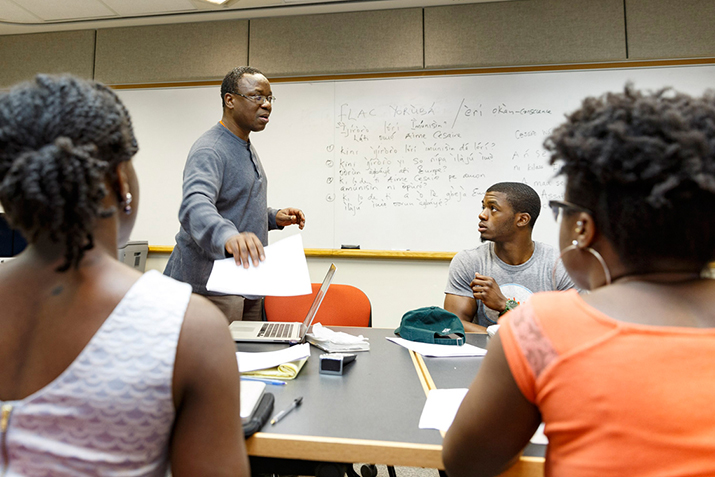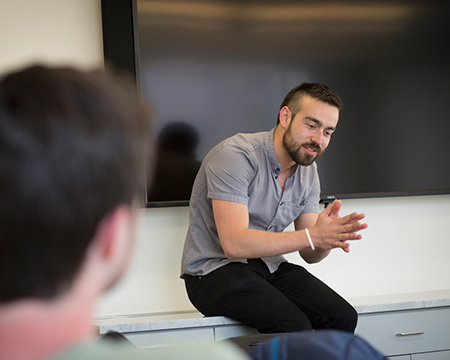Foreign Languages Across the Curriculum

Some 4,000 Cornell students study foreign languages each year, and 44 languages are currently offered at the university.
Formally launched by Cornell’s Language Resource Center in 2015–2016, the Foreign Languages Across the Curriculum program provides institutional support and aims to increase the opportunities available to students for integrating language study into their curricula. Cornell’s program is part of a larger global movement in foreign language instruction called Languages Across the Curriculum. The goal of the initiative is to give students multiple opportunities to apply their knowledge of languages in a variety of contexts—not just within the traditional language classroom.

The FLAC program at Cornell offers optional one-credit foreign language courses that are connected to a variety of existing academic courses offered by departments in colleges across the university. FLAC courses are not language courses, as the only language issues included are oral and written discourse conventions in the target language, or how people speak and write in the academic field in that language. Credit for FLAC participation is awarded independently of the main academic course.
“FLAC courses take language learning to the heart of the undergraduate experience, making language learning part and parcel of students’ substantive courses,” says Tom Pepinsky, associate professor of government, and a faculty sponsor of an Indonesian language FLAC course. “Nowhere else in the United States can students learn about Southeast Asian politics and history in a modern Southeast Asian language.”
The overall objective of the FLAC program is to give Cornell students an opportunity to practice and develop their fluency in the target language. FLAC courses are aimed at students whose fluency is at an intermediate level or above.
“I have been greatly impressed with my students' ability to understand and interpret original Cold War documents, which are complex in both expression and in terms of the historic discourse in which they were created,“ says senior lecturer Raissa Krivitsky, who is teaching the Russian FLAC class associated with the Government course, Reading about the Cold War.
FLAC courses attract three different kinds of language learners: native speakers, heritage speakers, and bottom-up learners—students who initially had no prior background in the language.
“This mix enables students to listen to and interact with native and heritage speakers with a wide range of accents,” explains Lisa Sansoucy, Cornell’s FLAC program coordinator. “For example, this semester we have two Spanish FLAC courses attached to Professor Hector Velez’s course, Latinos in the United States. The FLAC students are from all over the United States, the Caribbean, and Central and South America. They enjoy interacting with each other in Spanish and hearing accents from all across the hemisphere.”
Ingrid Winter, a sophomore in the College of Arts and Sciences, says “This class is helping me get an insider's view of many Latino matters by listening to my classmates.”

“The class has increased my awareness of, and general appreciation for, differences arising from the unique world-views and historical experiences of influential Hispanic ethnic groups in our country,” says Winter’s classmate Evan Harley Janssens, a senior in Arts and Sciences.
“Students have shared with me that they are afraid they will lose fluency in their native or heritage language once they come to Cornell and start attending classes in English,” says Sansoucy. “They like FLAC courses because there’s an opportunity to practice and maintain fluency. Students in the Yoruba FLAC, for example, have shared that they find it powerful to discuss concepts such as Afrocentrism or migration in their native or heritage language.”
Sansoucy is a heritage speaker of French, and she has also studied Latin, Russian, Vietnamese, and Japanese. “I am currently sitting in on the Latin FLAC course and learning a ton,” she says.
In her first year as program coordinator for FLAC, Sansoucy organized 12 FLAC courses in nine different languages, coordinating among two colleges and 19 departments.
In spring 2016 a total of 81 students are enrolled in Arabic, Mandarin, Hindi, Indonesian, Japanese, Latin, Russian, Spanish, and Yoruba FLAC courses at Cornell. The courses average 6 to 7 students per class and are focused on active discussion in the target language.
Sansoucy assists in identifying and supervising the instructors who are responsible for administering and conducting the FLAC sections. The instructors are a mix of professorial faculty, language lecturers, and graduate teaching assistants. A FLAC section thus adds no additional burden to the load of the instructor of the main course.
Demand for FLAC courses is strong among both faculty and students across the university. Next year, the program will likely expand to include courses in the Law School and Industrial and Labor Relations. Cornell may also add new languages into the FLAC offerings, including French, German, Modern Greek, Hebrew, Portuguese, and Swahili.
“I believe that language study opens up important new windows of opportunity and cultural understanding for students at any stage of their education,” says Sansoucy. “My work is very rewarding because the faculty and students involved in the FLAC program are so excited and enthusiastic.”
“Iro iro na gengogaku no sensei to issyo ni hataraite iru, ureshii desu,” Sansoucy says. Translation, Japanese to English: “I am happy to be working with many different language teachers.”
“The Japanese FLAC class has been a huge help in improving my fluency this semester,” says Michael Mauer, a sophomore in Arts and Sciences. “I'm learning how to discuss complex topics like art and religion, as we consider scrolls and poems in the language in which they were originally written. This goes way beyond the basic utilitarian phrases we learn in ordinary language classes.”
“We talk about issues that affect people of the African diaspora in America,” says Ololade Olawale, a sophomore in Arts and Sciences, and a participant in the Yoruba FLAC class. “This is truly a novel learning experience, as I get to discuss the stances of revolutionary minds in the African American community—in Yoruba.”
Cornell recently joined the Cultures and Languages Across the Curriculum Consortium, which will enable Cornell to network with other universities that offer FLAC programs.
Story by Linda Copman. Photography by University Communications/Marketing

